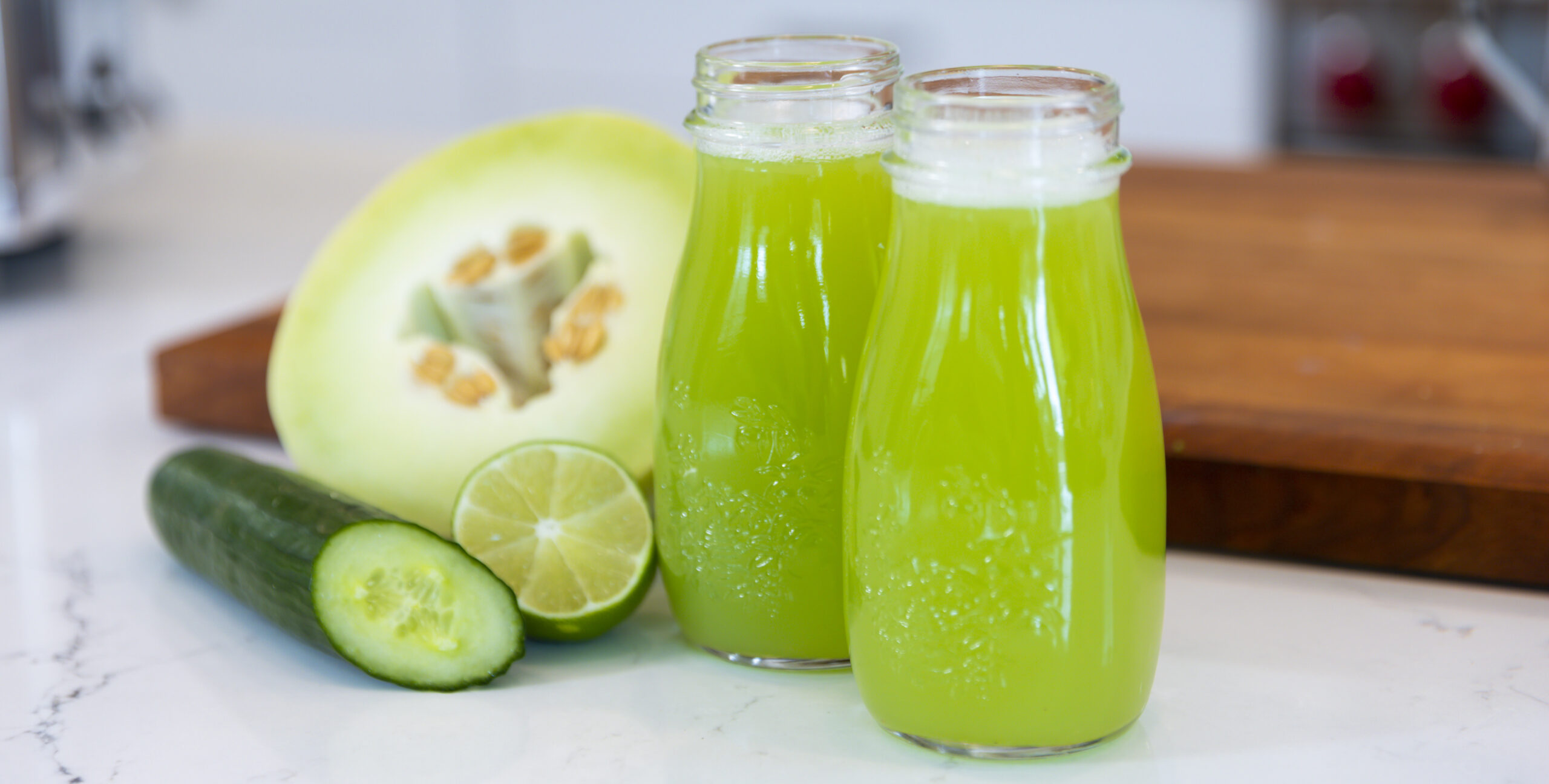What is Potassium’s Job?
Potassium plays a vital role in keeping our bodies running smoothly. Often called an electrolyte, it carries an electrical charge that wakes up our nerves and cells, getting them ready for action. Potassium ensures that the fluid levels inside our cells are just right, while its partner, sodium, manages the fluid outside. Potassium is also essential to our muscles, helping them contract and contributes to maintaining healthy blood pressure.

What Are Your Potassium Daily Needs?
The recommended daily intake of potassium varies based on age, sex, and overall health. However, generally speaking, adults are advised to consume around 2,600 to 3,400 milligrams (mg) of potassium each day. We found this great tool that gives you points for every type of fruit or vegetable you’d like to juice.
For example, our easy green detox juice has 88 points!
It’s important to note that specific potassium requirements can differ based on factors such as physical activity level, certain medical conditions (e.g., kidney problems), and medications you might be taking. Always consult with a healthcare professional or registered dietitian to determine the right potassium intake for your unique needs and circumstances.
Potassium and Health
Because of potassium’s wide-ranging roles in the body, low intakes can increase the risk of illness. There are four diseases and disorders in which lack of potassium might be involved: 1) hypertension and stroke, 2) kidney stones, 3) bone health, 4) blood glucose control and type 2 diabetes.
How it Affects Kidney Health
Potassium is very important for kidney health. Adequate potassium intake can help regulate blood pressure and encourage the excretion of excess sodium through urine, which helps prevent sodium-induced increases in blood pressure. Controlling blood pressure is vital for kidney health, as elevated blood pressure can strain the blood vessels in the kidneys and lead to kidney damage over time.
Additionally, the kidneys hold the vital role of filtering waste and excess substances from the blood to create urine. Potassium is one of the electrolytes that must be properly balanced to support this filtration process. Imbalances in potassium levels can disrupt kidney function and lead to issues like kidney stones. Cold-pressed juices are a great way to balance those electrolytes and support healthy kidney function.
Foods High in Potassium
Overall, it’s really simple to get your daily share of potassium. You can eat the following foods, or juice any combo of fruits and veggies on the list. Share with us your favorite potent potassium punch!
Fruits
- Bananas
- Oranges
- Cantaloupe
- Grapefruit
- Honeydew
- Blueberries
- Strawberries
- Watermelon
- Apricots
- Kiwi
- Prunes
Vegetables
- Cucumbers
- Mushrooms
- Pumpkins
- Spinach
- Sweet potatoes
- Potatoes (with skin)
- Tomatoes
- Beet greens
- Brussels sprouts
- Avocado

Easy Cold-Pressed Juices Loaded with Potassium
Here are a few of our favorite tasty, juicy ways to get the proper daily intake of potassium:

Grapefruit Goodness
4 Grapefruit
1 – 3” Turmeric
Yield – 24 oz

Cool Cantaloupe Cucumber
½ cantaloupe (pressed)
1 cucumber (grid #10 grind and press)
1 lime (pressed)
Yield – 20 oz

Watermelon Beet Lime
1 small watermelon (remove rind, press)
2 limes (press)
1 medium to small beet (#10 grid, grind and press)
Yield – 2 liters
Pro-Tip: Beets may have kick-back, so cover the feed chute when grinding (stage one).
Another delicious way to get your potassium allowance is by making this awesome smoothie bowl!
Sources:
- Harvard School of Public Health: Potassium | The Nutrition Source: https://www.hsph.harvard.edu/nutritionsource/potassium/#:~:text=Potassium%20is%20found%20naturally%20in,and%20supports%20normal%20blood%20pressure.
- Healthline: What Does Potassium Do for Your Body? https://www.healthline.com/nutrition/what-does-potassium-do
- American Heart Association: How Potassium Can Help Control High Blood Pressure: https://www.heart.org/en/health-topics/high-blood-pressure/changes-you-can-make-to-manage-high-blood-pressure/how-potassium-can-help-control-high-blood-pressure
- Cleveland Clinic: 10 Foods That Are High in Potassium: https://health.clevelandclinic.org/10-foods-that-are-high-in-potassium/
- Medical News Today: What to know about potassium levels and kidney disease: https://www.medicalnewstoday.com/articles/kidney-disease-and-potassium#:~:text=Potassium%20is%20a%20mineral%20and,complications%20that%20affect%20the%20kidneys.
- DaVita: Potassium and Chronic Kidney Disease: https://www.davita.com/diet-nutrition/articles/basics/potassium-and-chronic-kidney-disease
- PubMed Central: Effect of Potassium Citrate on Calcium Phosphate Stones: https://www.ncbi.nlm.nih.gov/pmc/articles/PMC4657843/
- NYU Langone Health: Medications & Dietary Changes for Kidney Stones: https://nyulangone.org/conditions/kidney-stones/treatments/medications-dietary-changes-for-kidney-stones
Medical Disclaimer
PURE Juicer is a juicing company. We are not doctors or medical experts. All content and information on this blog and website is for informational and educational purposes only, does not constitute medical advice, and does not establish any patient-client relationship by using this website.
Although we strive to provide accurate general information, the information presented here is not a substitute for professional advice. You should not rely solely on this information. Always consult a professional in your area for your health questions and concerns before making any professional, legal, medical, financial, or tax-related decisions.












